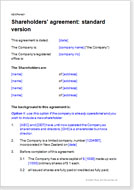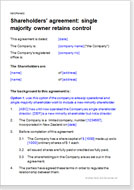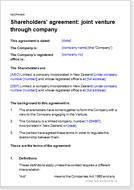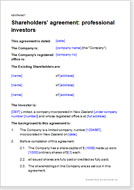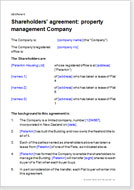What is a shareholders agreement?
A shareholders agreement is a legally binding, private document that sets out further powers, rights and obligations that the owners have to each other and the company, beyond those that already exist under law or through the constitution of the company.
In New Zealand, the Companies Act 1993 provides the over-arching rules under which all companies must operate including the rights and responsibilities of shareholders.
The company constitution sets out how an individual company is run by the board of directors and the shareholders. This document records how the owners control and manage the business between themselves, providing the basic business structure. Many of the matters covered are procedures, such as how meetings are called, or how an offer to buy shares should be made.
Further to that joint framework of the Companies Act 1993 and a company's constitution, using a shareholders' agreement, there is enormous scope to decide who may do what, and under what circumstances.
Why do I need a shareholders agreement with other owners?
Having a shareholders' agreement in place is essential for both majority and minority owners, for a small business or a large one.
The reason why to write one is not one of compliance with the law, but for the protection of your personal interests - even if you are a majority shareholder who owns more than half of the total share capital.
Minority shareholders are likely to want greater control over the decisions that influence the value of their holding than the law gives them by default.
A majority shareholder may wish to make sure that minority shareholders cannot sell their shares easily to anyone who may have different ideas about the direction the company should take, or that a previous employee who left the company as a result of poor behaviour (commonly known as a bad leaver) has no further say in the company.
Determining roles
Executive directors are employees, accountable to the company and its shareholders. Where directors are also stock holders, as is so often the case, a director may be able to make decisions that benefit themselves as a shareholder, but which are not in the interests of their fellow owners.
A shareholders agreement fulfils the role of an operating agreement. It allows you to set the limits of director power, and clarify what matters should be referred to the share holders for a decision. Doing so helps to ensure that owners are kept informed and that the most important decisions are made by them as a group, and not by the directors.
The converse applies too. An agreement can also define what decisions a shareholder-director may take freely, without requiring a members meeting, allowing confident, decisive action when it is needed.
An agreement can also help resolve deadlock in decision making between the owners as shareholders. Without such provisions, it is possible that a situation that is not beneficial for the company or any owner continues indefinitely.
Rebalance shareholder power on issues that are important to you
By default, voting power is in proportion to shares held. Your agreement can over-ride this basis, allowing you to specify the rules as to how decisions on subjects important to you are made. Minority shareholders can be given more say on certain issues.
You can go as far as to completely separate ownership and control: useful if some shareholders may not have experience or knowledge of running the company to allow them to make effective decisions. For family businesses and companies where some shareholders hold shares only as an investment, this ability to separate ownership from governance is likely to be a useful feature.
Control your investment
Having a written shareholders agreement in place can help prevent other owners from reducing the value of your investment by their actions. It can do this by setting out:
- requirements for disclosure and for approval for certain actions such as large asset purchases
- how issues of new shares are approved
- how assets, time, and expertise brought into the business should be valued on sale
- rights of refusal existing shareholders have over other prospective buyers when shares are offered for sale
- what happens when one of the shareholders is dismissed for poor behaviour (known as a bad leaver)
Guard your privacy relating to management of the company
Some aspects of management can be recorded in the company's constitution. However, your shareholders agreement is a private document that you don't have to file with the Companies Office or make publicly available.
Only you and the other owners will know the arrangements you have. How your company is managed therefore remains confidential. By including confidentiality provisions, you can further control sensitive information.
Reduce the likelihood and cost of disputes
In any company, disputes arise between owners and other stakeholders. They can be expensive to resolve, and disruptive and detrimental to the on-going operation of the business.
Many matters are likely to be discussed at each annual general meeting of the members. Some will require immediate action and therefore will be voted on. Others will come under strategic or contingency planning, such as under what circumstances owners agree to a merger if approached.
The likelihood is that over a period of time, consensus might be forgotten on any single issue if there wasn't a vote.
Discussing these matters at the outset when starting a new business or when a new shareholder arrives and then recording them in writing limits the scope for a single member to scupper the plans of the other stockholders by claiming that they had never been involved in such decisions.
The inclusion of a deadlock clause and a dispute resolution procedure (which could be arbitration or mediation) within each shareholder agreement template makes resolving any that do occur easier.
Retain control in difficult situations
A shareholders agreement allows you to plan for the worst so as to keep the business going. Within it, you can set out what would happen should certain events occur, whether how you deal the sudden departure of a key founder or the withdrawal of a source of funding.
Writing one, together with the other owners, is a process that allows you collectively to evaluate the risks to each of you. It can help with business planning, especially for a new business.
Plan for exit
An owner may have ideas as to when they want to sell their shares and which ones of the remaining shareholders takes over their role. A shareholders agreement can ensure this happens.
The law in these shareholder agreements
The law relating to these documents is both corporate law (principally the Companies Act 1993) and commercial contract law.
Your shareholders agreement is always subject to constitution of your company. If you are putting one in place, it is usually a good time also to review and update your company's constitution to make sure that there are no conflicts between the two documents.

